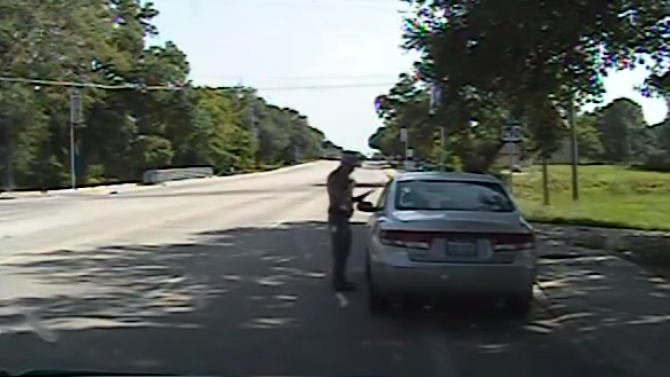Thanks to the Supreme Court, Traffic Stops Can Become a Gamble Between Life and Death
Share
Explore Our Galleries
Breaking News!
Today's news and culture by Black and other reporters in the Black and mainstream media.
Ways to Support ABHM?
By Charles D. Ellison, theRoot.com
Recent rulings and past decisions have given police officers the legal elbow room to stop, frisk and arrest whomever they want.
As we delve deeper into every minute of the infamous Sandra Bland stop seen around the world, experts (as expected) are clawing into every legal nook and cranny to ask one of the most pressing questions of 2015: Exactly how many rights do you have should you see red and blue lights flashing in the rear view?
It’s not crystal clear. While we’d like to think we have enough constitutional armor to take on a trigger-snapping squad of Boss Hog’s finest, the unfortunate reality is that we don’t. Thanks to a permanently ideological Supreme Court dominated by conservative stalwarts, the cops have even more rights than you do…even with increased smartphone surveillance and hourly scrutiny of police, law enforcement seems strangely emboldened … and even dismissive.
Quite a few folks, including the Center for American Progress, have cited the Rodriguez v. United States (pdf) decision in April as good-enough reason that Bland should never have seen the inside of a jail. As Supreme Court Justice Ruth Bader Ginsburg put it, “The tolerable duration of police inquiries in the traffic-stop context is determined by the seizure’s ‘mission’—to address the traffic violation that warranted the stop, and attend to related safety concerns.”…
Although Rodriguez may have resolved traffic-stop length of time, it didn’t address the much more consequential traffic-stop reasoning the same way a less-hyped Heien v. North Carolina ruling did when it dropped last December.
Heien is like the legal Godzilla of bad cop excuses: An officer’s “mistake of law,” opined conservative Chief Justice John Roberts, can be constitutional so long as it’s all “reasonable.” In essence, it gives aggressive police officers the kind of legal elbow room they need for misconduct; or, as criminal-justice expert Lauren Kirchner explains, “[I]t essentially gives cops even more latitude than they already had, to stop whomever they want, for whatever pretext they claim.”
Heien also pretty much played backup to another little-known 1997 ruling, called Maryland v. Wilson, in which the court agreed that officers can order passengers out of cars during any traffic stop, crime or no crime. Then-Chief Justice William H. Rehnquist wrote at the time that “the same weighty interest in officer safety is present regardless of whether the occupant of the stopped car is a driver or passenger.”
This all makes Rodriguez relatively empty. Not only did Heien and Maryland make cops legally invincible and always right during traffic stops, but both cases also offer them convenient justifications, despite mountains of empirical evidence proving persistent frisk and ticket racial gaps on the side of the road.
In the final analysis, it should prompt us to think twice if stopped by the fuzz. The reasons are a mix of the political, the practical and the jurisprudence outlined above.
Politically, in both courts of law and public opinion, it’s still a world in which a cop’s word is perceived as more trustworthy than the victim’s…
Read the full article here.
Read more Breaking News here.












Comments Are Welcome
Note: We moderate submissions in order to create a space for meaningful dialogue, a space where museum visitors – adults and youth –– can exchange informed, thoughtful, and relevant comments that add value to our exhibits.
Racial slurs, personal attacks, obscenity, profanity, and SHOUTING do not meet the above standard. Such comments are posted in the exhibit Hateful Speech. Commercial promotions, impersonations, and incoherent comments likewise fail to meet our goals, so will not be posted. Submissions longer than 120 words will be shortened.
See our full Comments Policy here.